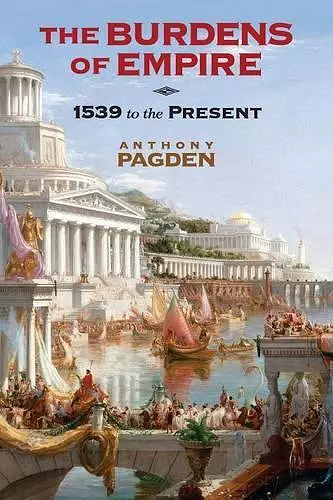The Burdens of Empire
1539 to the Present
Format:Paperback
Publisher:Cambridge University Press
Published:19th Mar '15
Currently unavailable, and unfortunately no date known when it will be back
This paperback is available in another edition too:
- Hardback£79.99(9780521198271)

This book examines how modern Western history has been shaped by the rise and fall of the great European empires.
The entire course of modern Western history has been shaped by the rise and fall of the great European empires. The Burdens of Empire examines different aspects of this long history, focusing on how political theorists, jurists, historians and others sought to explain what an empire is and to justify its very existence.Despite the long history of debate and the recent resurgence of interest in empires and imperialism, no one seems very clear as to what exactly an empire is. The Burdens of Empire strives to offer not only a definition but also a working description. This book examines how empires were conceived by those who ruled them and lived under them; it looks at the relations, real or imagined, between the imperial metropolis (when one existed) and its outlying provinces or colonies; and it asks how the laws that governed the various parts and various ethnic groups, of which all empires were made, were conceived and interpreted. Anthony Pagden argues that the evolution of the modern concept of the relationship between states, and in particular the modern conception of international law, cannot be understood apart from the long history of European empire building.
'No scholar has done more than Anthony Pagden to direct attention to the forms and fates of empire across human history. The Burdens of Empire should command a wide audience among intellectual historians, political theorists, early modernists, and imperial historians at all levels.' David Armitage, Lloyd C. Blankfein Professor of History and Chair of History, Harvard University, Massachusetts, and author of Foundations of Modern International Thought
'These brilliant meditations on the durability of empire as a political form, and on the imperial origins of universal ideals from Stoic cosmopolitanism to international law and contemporary human rights, repeatedly demonstrate the novel theoretical insight that can come from immersive historical study. The chapter on imperial Spain ('Cambiar su ser') is a tour de force that exhibits Pagden's unrivalled authority on the political thought of the Spanish empire. With trenchant analysis, a wealth of information, and great breadth of reference, The Burdens of Empire breathes fresh life into themes from European aspirations to civilize 'barbarians', to the dangers of unlimited expansion, to the rise of political economy in the eighteenth century.' Jennifer Pitts, University of Chicago
'Anthony Pagden has long been among the most penetrating and learned historians of early modern empire and political thought. The Burdens of Empire charts, with extraordinary lucidity, the implication of law in the European project of empire. This history includes complex efforts of both constraint on conquest and its legitimation. Above all, Pagden reveals the endowment left to the project of international law by its birth, alongside modern nationalism, in the crucible of the nineteenth century.' Cliff Ando, David B. and Clara E. Stern Professor, University of Chicago
'In this series of essays, Pagden examines enduring themes in the history of empire, underscoring ways in which intellectual, legal, and moral debates generated by imperial rule fundamentally shaped concepts of such universal ideals as human rights and international law … In the book's nine chapters, Pagden treats such topics as the legality of European conquests in the Americas, conceptions of human difference, arguments over control of the seas, and changing valuations of conquest and commerce in imperial ideologies, among others. He successfully carries his themes across the different chapters, which make a forceful case for the significance of imperial history in understanding the modern world, particularly ancient and early modern intellectual history. Summing up: highly recommended.' M. A. Soderstrom, Choice
'In this erudite and sophisticated volume, one of the world's leading historians of the early modern European imperial imagination brings together some of the best of his life's work on the intellectual history of empire.' Ricardo Padrón, E-International Relations (www.e-ir.info)
'Scholars of empire, international relations, and human rights will learn a lot from the author's breathtaking knowledge of European legal, theoretical, and moral claims for and against empire in the early modern period.' Pernille Røge, Journal of World History
ISBN: 9780521188289
Dimensions: 230mm x 150mm x 20mm
Weight: 430g
302 pages